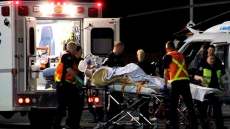Vancouver – With B.C. experiencing ongoing increases of syphilis infections, the Office of the Provincial Health Officer and the BC Centre for Disease Control (BCCDC) are reminding British Columbians to speak with their health care professional about testing for sexually transmitted infections (STIs), especially those with new sexual partners, or people who are pregnant.
Syphilis is an infection that can be acquired through oral, vaginal and anal sexual contact with a person who has infectious syphilis or skin-to-skin contact with a syphilis lesion (chancre) or rash.
Syphilis can be transmitted from a pregnant woman to their unborn child in pregnancy or during childbirth.
There were 919 new cases of infectious syphilis in B.C. in 2018, a rate of 18.4 per 100,000. This represents a 33 per cent increase from 2017. In B.C., the majority of infections occur in gay, bisexual and other men who have sex with men.
“After seeing syphilis infections decrease for several years, rates of syphilis began to climb again earlier this decade,” said Dr. Bonnie Henry, Provincial Health Officer.
“We’ve been working to address syphilis in B.C. and raise awareness about testing among men who have sex with men. We are currently working with our partners to see what more we can do to reduce the number of infections but we also need the public to be aware of the risk and to be proactive about testing and treatment.”
While syphilis continues to disproportionately affect gay, bisexual and other men who have sex with men in B.C., infections are also increasing among women. There has been a nearly 40 per cent increase of infectious syphilis among women 15 to 49 years old from 2017 to 2018.
Syphilis and pregnancy
In response to the increase in cases among women, B.C. has implemented a temporary change to syphilis screening guidelines during pregnancy.
In addition to the routine screening that already takes place during the first trimester of pregnancy and ongoing screening during pregnancy for individuals at higher risk of syphilis, it is now recommended that all pregnant individuals get tested again around the time of delivery.
Treating those infected with syphilis during pregnancy helps prevent congenital syphilis, where the infection is passed from the mother to the baby during pregnancy or delivery. If left untreated, syphilis during pregnancy can lead to premature birth, low birth weight, long-term neurological issues, bone deformities, deafness, or even stillbirth.
After many years of no cases of congenital syphilis in the province, B.C. identified two cases in 2019.
“This is an interim measure in response to an outbreak and aligns with actions taken by other provinces to prevent a serious infection that can harm both mother and baby,” said Dr. Mark Gilbert, medical director for Clinical Prevention Services at the BC Centre for Disease Control. “The additional screening will help us detect and treat maternal and congenital syphilis infections and understand the prevalence of maternal and congenital syphilis in the province.”
Many Canadian provinces are experiencing significant increases in syphilis and some are also responding to increases in congenital syphilis. Alberta and Manitoba have reported over 10 cases of congenital syphilis each in the last year, and also recommend prenatal syphilis screening to include testing at delivery.
Syphilis is a bacterial infection that can be cured with antibiotics. If left untreated, syphilis can lead to serious complications including damage to the brain, heart and other organs, and can be associated with a greater risk of acquiring or transmitting HIV. A blood test will diagnose a syphilis infection.
Quick Facts about syphilis:
· You can get syphilis through oral, vaginal and anal sexual contact or close skin-to-skin contact with a syphilis lesion or rash.
· Syphilis infections can have no symptoms and so a person may not know they have it. Symptoms can include a hard painless sore usually on the genitals or other sites of contact such as the mouth or anus. Other symptoms can include a flat, red skin rash on the back, chest, hands or feet, fever, swelling of the glands, genital rash, hair loss and fatigue.
· A blood test can be done to check if you have syphilis.
· Syphilis is curable with antibiotics, and the earlier the treatment, the more likely that complications will be prevented. Early diagnosis and treatment will also prevent transmission. If treated at a later stage, antibiotic treatment cannot undo the damage already caused by syphilis, but it can prevent further health complications.
· People can get syphilis multiple times in their life.
· Use of condoms during close and/or sexual contact works well to reduce your chances of getting or transmitting syphilis. Be aware that you can still get syphilis with a condom because syphilis sores can occur in places not covered by a condom.
· If you are pregnant, you should be screened for syphilis by your maternity care provider during the first trimester and again around the time of delivery. You can transmit syphilis to your baby during pregnancy or delivery. Congenital syphilis can have serious health effects on your baby. In severe cases, it can lead to stillbirth or death.
· Get tested regularly for STIs, especially if you have signs or symptoms, a new sexual partner, multiple partners or if you have a sexual partner who has tested positive for syphilis.
· Get tested at:
o A sexual health clinic. Use the clinic finder to find a location near you: https://smartsexresource.com/get-tested/clinic-finder
o Your family doctor or a walk-in clinic.


